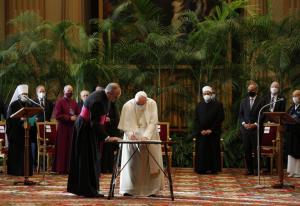
An article by The Guardian’s liberal columnist George Monbiot could have been written by any of the last several popes. It explains why a movement to limit births had a change of heart. BirthStrike was founded by women who want the world to focus on impending environmental collapse. Their attention-getting strategy was to announce their intention not to have children. Next week the group will dissolve itself. Founders Jessica Johannesson and Blythe Pepino explain that they had “underestimated the power of ‘overpopulation’ as a growing form of climate breakdown denial.”
What the founders fear is being denied is too obvious. Primary responsibility for damage to the environment, including climate change, belongs with the world’s rich nations. The name and theme of their organization, they realized, too easily led to placing blame for climate and other environment crises on high birth rates. These exist primarily in poor countries, so the rich are off the hook!
Environmental footprint formula
Population does figure in the breakdown of environmental systems. We can’t ignore that. But compared to other factors, population’s role is a small one. The formula for estimating people’s environmental footprint is:
Impact = Population x Affluence x Technology (I = PAT)
Since population increase is concentrated in countries where most people have very little A and T, Monbiot says,
The extra resource use and greenhouse gas emissions caused by a rising human population are a tiny fraction of the impact of consumption growth…. Panic about population growth enables the people most responsible for the impacts of rising consumption (the affluent) to blame those who are least responsible.
I was disappointed to see Jane Goodall, world renowned primatologist, involved in this blame game. She is a patron of Population Matters, a group that some criticize as racist. Last year Goodall told the World Economic Form human population growth was responsible for ecological problems. Such problems wouldn’t exist “if there was the size of population that there was 500 years ago,” Monbiot reports that she said.
Population Matters has been criticized before for blaming the victims of ecological crises. Green European Journal provides an illustration, which I paraphrase:
- The birth rate in Mali is 6.29 births per woman. It’s 2.1 for women in the U.S.
- On average a person in Mali emits 0.06 tons of CO2 per year, compared to 17 in the U.S.
- The average American is responsible for about 283 times as much carbon as the average Malian.
- Conclusion: “[C]omplaining about another Malian baby seems foolish.”
Population talk “serves to shift blame from the rich in the west (and the capitalist system established by the rich in the west) and onto those who are least to blame,” the Green Journal article says.
Birthstrike looks at climate justice
Following the end of BirthStrike will be what the founders (who go by their first names, Jessica and Blythe) call a support group. It has the long title “Grieving Parenthood in the Climate Crisis: Channeling Loss into Climate Justice.” A BirthStrike statement explaining the change says concentrating on population means “justice has often been on the back burner.”
The founders mention recent racial protests over police killings of innocent people of color as motivation for their change of heart. After all, there is an implicit racism in even well-meaning concentration on population in the climate and environment crisis. It’s always people in other countries, brown and black people, of course, who need to have fewer babies. Getting back to Jane Goodall and that Davos conference, Monbiot comments wryly about the “pollutocrats” in attendance: “I doubt that any of those who nodded and clapped were thinking, “Yes, I urgently need to disappear.”
On not talking about population
Environmental journalist David Roberts echoes the new realization by BirthStrike. He explains why he never writes about overpopulation. It’s not that population isn’t part of the problem, but
Talking about population growth is morally and politically fraught, [and] the best ways of tackling it … don’t necessitate talking about it at all.
Racism, xenophobia, and eugenics are “lurking in the wings” when the concern is overpopulation. Also anti-immigrant sentiment, particularly strong in the U.S. today. So how do we address population stress without naming it? Two ways, Roberts says—education of girls and empowerment of women. Both are essentially in line with Catholic teaching. Roberts continues:
Those are the two most powerful levers to bend the population curve. They are also, in and of themselves, an enormously powerful climate policy. When Paul Hawken and his team investigated and ranked carbon-reduction solutions for their Drawdown project, they found that the combination of the two (call it the female-empowerment package) carried the most potential to reduce greenhouse gases later this century, out of any solution.
I should mention that Roberts’ “female-empowerment package” includes family planning services. He doesn’t mention, or exclude, methods the Church calls immoral.
Earth’s human population will increase, but at some point, at some unknown sustainable level, it must stabilize. The standard of living of ordinary people in developing countries must improve. And pollution and consumption of earth’s resources must decline from current unsustainable levels. Is a capitalist economy up to this triple moral challenge?
Image credit: BirthStrike












